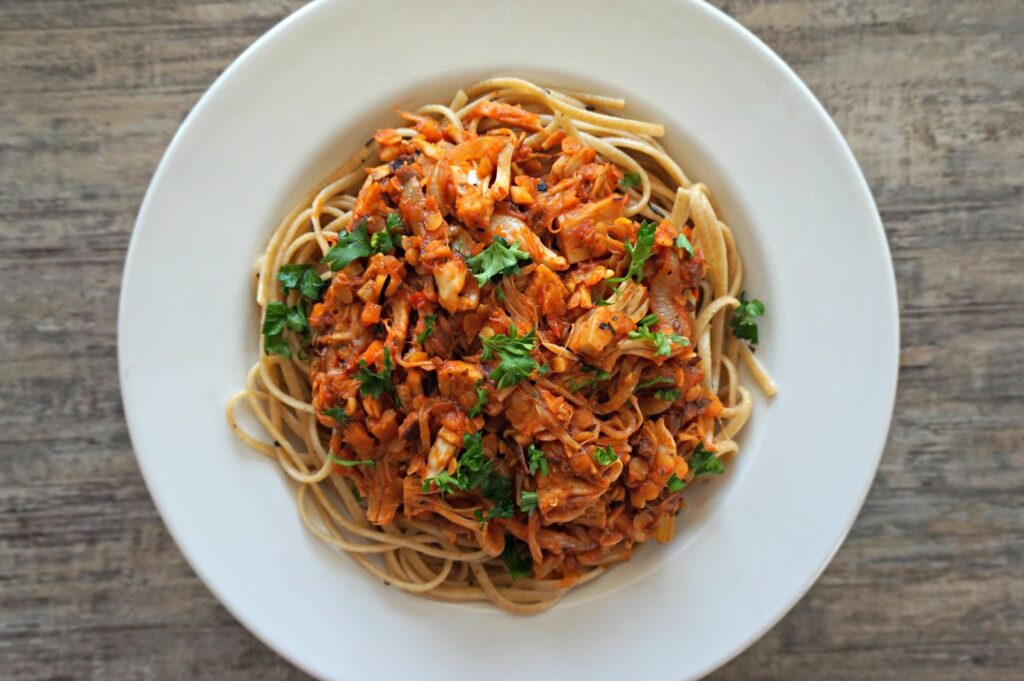
Plant Prepped the first and only 100% vegetarian meal kit delivery service in Canada.
Every week the staff create six new plant-based dishes, and customers choose three meals that they would like to have delivered that week. Customers can subscribe to the two-person plan or the four-person plan, and have the option to skip a week at any time.
Not only are the meals vegetarian, but there are always gluten-free and soy-free options available.
“Our goal is to make dinner time easy and convenient,” says owner Ilana Tarutina. “Our customers put the meals together at home in a fraction of the time and know that they are eating fresh food that is good for them.”
Plant Prepped is located in Cornwall, Ontario, and meal kits are delivered every Tuesday for free to most of Ontario and Quebec. Kits include recipe cards with instructions for each meal, and all the pre-measured ingredients you need to create restaurant-quality, plant-based meals at home.
Tarutina says that more and more people are becoming interested in the vegetarian lifestyle, so the company’s goal is to make plant-based eating easier and more accessible to the average consumer. Many of the ingredients used in the kits are organic and locally-sourced as well, so customers know they are getting a high-quality product.
How much does it cost?
The cost varies depending on the size of your order. As mentioned, there are two options: the two-person plan and the four-person plan. With both plans you receive three meals each week.
The two-person plan
Cost: $72.99/week
Cost/serving: $12.16
The four-person plan
Cost: $139.99/week
Cost/serving: $11.66
While the cost per serving may seem high to some, it is far below the average price of a restaurant meal in Canada, which is $20 and comparable to other meal delivery kids in Canada. If you are someone who often feels pressed for time and ends up eating out multiple times per week, this service is saving you money.
Example meals
Jackfruit Cacciatore
This dish is gluten-free and soy-free, can be made in forty minutes, and provides 623 calories per serving.
Broccoli two ways: quinoa bowl with turmeric ginger carrots
This dish is gluten-free and soy-free, can be made in thirty minutes and provides 631 calories per serving.
Tofu banh mi with chili mayo, pickled veggies, roasted broccoli, and mini potatoes
This dish contains both soy and gluten, can be prepared in forty minutes and provides 614 calories per serving.
Why choose a plant-based diet?
Eating a plant-based diet provides a number of benefits, but what does it mean exactly? Put simply, a plant-based, or plant-forward, way of eating means that your diet focuses primarily on plants. It doesn’t necessarily mean that you are vegetarian or vegan, but that you proportionately choose more foods that come from plant sources.
You may choose to include eggs, dairy, fish, and some meat in your diet, but these foods are consumed less frequently and in smaller quantities.
The health benefits of a plant-based diet
A plant-based diet can improve your health in a number of ways because it encourages you to eat lots of fruits and vegetables. Not only can adopting a plant-based diet help you to lose weight, but it has been shown to help people keep weight off in the long-run, too.
Eating more plants and less of everything else can also protect your heart. A study of over 200 000 people found that those who followed a diet rich in vegetables, fruits, legumes, whole-grains, and nuts, had a significantly lower risk of developing heart disease than those who did not.
Research also suggests that a plant-based diet can lower your risk of developing certain types of cancer, specifically those who follow a lacto-ovo vegetarian diet (those who eat eggs and dairy). Pescatarians (those who eat fish) have the lowest risk of developing colorectal cancer.
A plant-based diet has also been associated with the prevention of cognitive decline and Alzheimer’s disease, and can be used as a tool to help manage diabetes.
The environmental benefits of a plant-based diet
Decreasing your meat consumption can also have a significant impact on the planet, and adopting a plant-based diet can significantly reduce your carbon footprint.
Animal agriculture consumes massive amounts of water. Approximately 43 000 litres of water are required to produce one kilogram of beef, compared to one kilogram of cereal grain, which only requires one thousand litres.
Livestock production is alo a significant contributor to pollution and land degradation. The livestock sector takes up 30% of all ice-free land on earth, uses one third of the world’s fresh water, and one third of all the world’s cropland for feed.
This has caused the extinction of a significant number of animal species, contributed to ocean dead zones, and destroyed countless animal habitats across the globe.
The tens of billions of cattle, sheep, pigs, poultry, and other animals contribute significantly to global greenhouse gas emissions. The United Nations estimated that animal agriculture contributes about 18% of CO2 emissions, however another 2009 study has suggested that this number is actually over fifty percent.
The paper suggested that domesticated animals contribute 32 billion tonnes of carbon dioxide equivalent (a term used to describe different greenhouse gasses in a common unit) to the atmosphere each year, more than the combined impact of industry and energy.
Plant-based diets: better for you, better for the planet
If you’re looking for a way to improve your health or you’re trying to reduce your impact on the planet as much as possible, adopting a plant-based diet can help you accomplish both of those goals in one shot.
Changing the way you eat can be challenging and intimidating, but Plant Prepped makes it easy and convenient for you to dip your toes into the world of plant-based eating, and allows you to discover how delicious meatless meals can be.
Even just eating just 3 meatless meals per week can have a profound impact on your health, and as they say on their website, “Every effort counts, even if you’re just starting out with doing meatless Mondays.”













